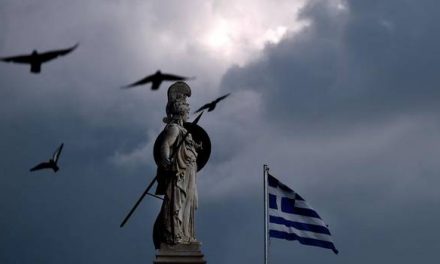By NICHOLAS GAGE, The New York Times
Throughout their history, Greeks in times of crisis have rushed to embrace charismatic demagogues like lemmings throwing themselves into the sea.
After the death of Pericles during the Peloponnesian War, Athenians allowed his seductive nephew, Alcibiades, then 35, to talk them into wasting most of their remaining military resources on a disastrous expedition in Sicily. Despite the terrible losses suffered in that debacle and even after he betrayed them to both the Spartans and the Persians, they took him back to their bosom twice.
After World War II, Nikos Zachariadis, the dynamic 43-year-old leader of the Greek Communist Party, eschewed the example of wiser Communist bosses like Palmiro Togliatti in Italy, who restrained his followers from armed rebellion even after an attempt on his life.
Mr. Zachariadis launched a brutal civil war in Greece that devastated the country as it was emerging from a harrowing Nazi occupation. Despite the futility of the conflict, enough Greeks followed Mr. Zachariadis to prolong the insurrection for four years. Not only did the conflict claim more than 50,000 lives and turn a tenth of the population into war refugees, but it also put Greece at least a decade behind Western Europe in beginning its post-war reconstruction.
The new pied piper of Hellas is Alexis Tsipras, 37, the leftist rabble rouser with keen political instincts and few scruples who led his radical left coalition, Syriza, to an astonishing second place finish in the May 6 election.
The always tieless Mr. Tsipras, a civil engineer from a prosperous family, deftly exploited anger against the austerity measures imposed by the European Union and the International Monetary Fund on the Greek people, who have seen their earnings plummet and unemployment rise to 22 percent.
Mr. Tsipras boldly proclaimed that his party will not honor the commitments Greece made in exchange for funds to keep the country afloat.
Mr. Tsipras, who has forced Greece into new elections by refusing to join or endorse any coalition government, is highly adept at the big lie. Since most Greeks hate the austerity measures but don’t want to leave the euro, Mr. Tsipras has vowed to defy the agreements but to keep Greece in the euro zone, although the chance of that happening is about as high as seeing snow fall in Athens in July.
He is not averse to using every form of pressure and intimidation available to achieve his goals, as those who know Mr. Tsipras have testified.
An adviser to the Democratic Left, a party that split from Syriza, told The New York Times that his party would not join any coalition to form a government that did not include Syriza because Syriza would unleash such “rage” that the government would not be allowed to stand “even for a day.”
Greek police officials say Syriza encouraged the violent demonstrations that have plagued Athens over the past two years. Unlike all other Greek political leaders.
Mr. Tsipras refused to condemn the extremist gangs that burned large swaths of Athens during those protests, even after one group set fire to a bank branch that killed three employees, including a pregnant woman.
Everyone agrees that Tsipras is an astute political tactician.
I was in Athens for the May 6 election when he turned Syriza — which barely made it into Parliament in the last election — into the main engine for voter discontent. He stayed on message throughout — down with austerity! — and was consistently on the attack, repeatedly calling the leaders of the two major parties, Evangelos Venizelos of Pasok and Antonis Samaras of New Democracy, traitors and con men because they signed the agreements with the Europeans.
Mr. Tsipras outmaneuvered his opponents throughout the campaign, setting the agenda at every turn with provocative initiatives that kept media attention continuously on him while the others labored on with long, bromide-filled speeches that made little impact on voters. It’s no wonder his party soared when the votes were counted and the others fell to historic lows.
Yet despite his obvious gifts, Mr. Tsipras poses the same risks for Greeks today as the charismatic demagogues of the past did in their time.
If he comes to power and refuses to honor the country’s commitments and Greece is forced out of the euro and back to the drachma, the very people Mr. Tsipras pretends to champion, Greek workers, will suffer the most. He will be able to print money and raise salaries and pensions, but inflation will reduce purchasing power below anything Greeks can imagine.
The owner of a major hotel in Athens told me that as soon as Greece returns to the drachma, his labor costs will fall from 57 percent to 26 percent of his budget.
Those who would benefit most from the return of the drachma are the profiteers Mr. Tsipras rails against — Greek oligarchs and foreign speculators, who are waiting to swoop down and buy valuable state assets and prized resort properties on the cheap, about one fifth their current value, according to some experts.
Yet many Greeks look to Alexis Tsipras as the leader they have been waiting for — bold, daring, cunning. What they don’t realize is that he is also very dangerous, with a vision for Greece that will isolate it from the rest of Europe and reduce its people to the kind of poverty they have not seen in half a century.



















